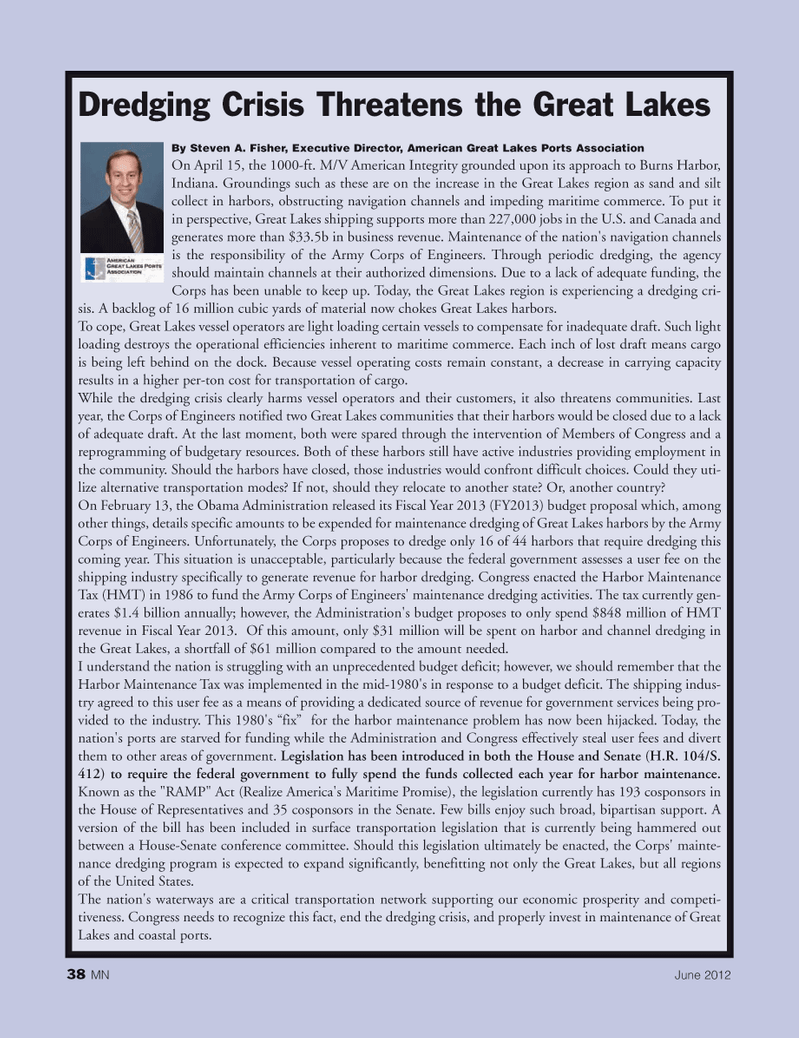
Page 38: of Marine News Magazine (June 2012)
Dredging & Marine Construction
Read this page in Pdf, Flash or Html5 edition of June 2012 Marine News Magazine
38MNJune 2012Dredging Crisis Threatens the Great Lakes By Steven A. Fisher, Executive Director, American Great Lakes Ports Association On April 15, the 1000-ft. M/V American Integrity grounded upon its approach to Burns Harbor, Indiana. Groundings such as these are on the increase in the Great Lakes region as sand and silt collect in harbors, obstructing navigation channels and impeding maritime commerce. To put it in perspective, Great Lakes shipping supports more than 227,000 jobs in the U.S. and Canada and generates more than $33.5b in business revenue. Maintenance of the nation's navigation channels is the responsibility of the Army Corps of Engineers. Through periodic dredging, the agency should maintain channels at their authorized dimensions. Due to a lack of adequate funding, the Corps has been unable to keep up. Today, the Great Lakes region is experiencing a dredging cri- sis. A backlog of 16 million cubic yards of material now chokes Great Lakes harbors. To cope, Great Lakes vessel operators are light loading certain vessels to compensate for inadequate draft. Such light loading destroys the operational efficiencies inherent to maritime commerce. Each inch of lost draft means cargo is being left behind on the dock. Because vessel operating costs remain constant, a decrease in carrying capacity results in a higher per-ton cost for transportation of cargo. While the dredging crisis clearly harms vessel operators and their customers, it also threatens communities. Last year, the Corps of Engineers notified two Great Lakes communities that their harbors would be closed due to a lack of adequate draft. At the last moment, both were spared through the intervention of Members of Congress and a reprogramming of budgetary resources. Both of these harbors still have active industries providing employment in the community. Should the harbors have closed, those industries would confront difficult choices. Could they uti- lize alternative transportation modes? If not, should they relocate to another state? Or, another country? On February 13, the Obama Administration released its Fiscal Year 2013 (FY2013) budget proposal which, among other things, details specific amounts to be expended for maintenance dredging of Great Lakes harbors by the Army Corps of Engineers. Unfortunately, the Corps proposes to dredge only 16 of 44 harbors that require dredging this coming year. This situation is unacceptable, particularly because the federal government assesses a user fee on the shipping industry specifically to generate revenue for harbor dredging. Congress enacted the Harbor Maintenance Tax (HMT) in 1986 to fund the Army Corps of Engineers' maintenance dredging activities. The tax currently gen- erates $1.4 billion annually; however, the Administration's budget proposes to only spend $848 million of HMT revenue in Fiscal Year 2013. Of this amount, only $31 million will be spent on harbor and channel dredging in the Great Lakes, a shortfall of $61 million compared to the amount needed. I understand the nation is struggling with an unprecedented budget deficit; however, we should remember that the Harbor Maintenance Tax was implemented in the mid-1980's in response to a budget deficit. The shipping indus- try agreed to this user fee as a means of providing a dedicated source of revenue for government services being pro- vided to the industry. This 1980's fix? for the harbor maintenance problem has now been hijacked. Today, the nation's ports are starved for funding while the Administration and Congress effectively steal user fees and divert them to other areas of government. Legislation has been introduced in both the House and Senate (H.R. 104/S. 412) to require the federal government to fully spend the funds collected each year for harbor maintenance. Known as the "RAMP" Act (Realize America's Maritime Promise), the legislation currently has 193 cosponsors in the House of Representatives and 35 cosponsors in the Senate. Few bills enjoy such broad, bipartisan support. A version of the bill has been included in surface transportation legislation that is currently being hammered out between a House-Senate conference committee. Should this legislation ultimately be enacted, the Corps' mainte- nance dredging program is expected to expand significantly, benefitting not only the Great Lakes, but all regions of the United States. The nation's waterways are a critical transportation network supporting our economic prosperity and competi- tiveness. Congress needs to recognize this fact, end the dredging crisis, and properly invest in maintenance of Great Lakes and coastal ports.

 37
37

 39
39
